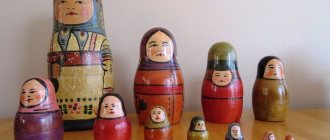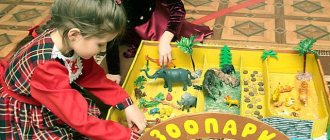Games for developing coherent speech
Incompetent writer
Setting the T sound
Formulation, construction of complex sentences, development of logical thinking
A writer came to visit the children who could not finish a children's book, because his stories had a beginning, but nowhere was there an ending. He asks the children for help: tell me how each of the stories could end.
Read the beginning of prepared sentences, then add a “why” question and ask children to begin their answer with “because,” and then repeat the entire sentence.
Examples:
“Dad brought home a cake and put it on the balcony.. (why?) because our refrigerator was broken.”
“Masha won’t go to bed at nine o’clock today... (why?) Because today is December 31st, and everyone is celebrating the New Year.”
“A striped cat climbed a tall tree and meows... (why?) Because it can’t come back down.”
Head or tail?
Making a story based on a picture
For the game, prepare plot serial pictures illustrating a single story. Mix them up and tell the children that the magic snake, who can read and tell stories, is asking for help: you need to arrange the pictures in the order in which the fairy tale depicted on them develops. Discuss each card, ask the children, encourage them to talk about what is drawn, in which part of the chain it should be placed.
Upon completion of the task, ask the snake to “read” the resulting story.
In pursuit of fashionable and modern games, do not forget about the classics of children's yard games that are familiar to you from childhood. “Edible/Inedible” and “Broken Phone” have been among the most popular and generation-tested games for speech development for decades.
Games for the formation and development of vocabulary
"Pack your luggage"
Generalization and grouping by characteristics
To begin, prepare cards with images of various objects in such a way that at least every 3 (or more) of them relate to the same topic or can be generalized according to some characteristic (food, toys, everything green, everything soft, found only in winter) . There should be as many thematic features as there are participants playing, plus 1-2 “spare” ones. Give each player a basket (box, suitcase). Hide the cards in an opaque container or turn them upside down.
Tell the children that soon you will go to a distant magical land. Everyone can take with them in their luggage only those things that have some common feature. Invite the first child to draw one card at random. Discuss with the children the properties of this object, its purpose, remarkable features, differences. The first card will go into the first player's "suitcase".
The second child pulls out his card. The discussion is repeated. Work with your children to determine whether this item is in the same category as the first. If yes, the first player takes the card. If not, the second person puts this item in his “baggage” and passes the turn to the next participant.
The game continues until each child has 3 items in their suitcase (or more if you have selected more than 3 thematic cards of each type for each player).
"Shifters"
Selection of antonyms
The game is dynamic, suitable for working with the ball (throwing it to each other, calling the word), relay races, jumping, etc.
The presenter calls the word and hands the child the ball (or performs another action). In response, the child must name the word that has the opposite meaning as quickly as possible. Players can give each other hints, developing an active vocabulary together.
"Journalists"
Formulating questions, using verbs
Tell us that today the children will work as journalists and interview each other. Prepare two chairs, as in a real TV broadcast, an improvised microphone and call the first pair of participants.
For each, prepare a certain topic, event or phenomenon about which you can tell what exactly it does. Whisper the topic (in one word) into the ear of the “journalist” and offer to “take an interview” - make up the question “What does it do?” with the hidden word. The second child will have to answer the question, remembering the skills, abilities and capabilities of the hidden noun.
Example: Sun. “Tell me, what does the sun do? – The sun is shining, warming, rising, shining.
Dog. “Please tell us what the dog is doing? – Barks, bites, growls, guards.
After the interview is over, the floor is given to the “guests in the studio,” other children, asking them to come up with other verbs related to this noun. Then the participants change roles, repeat the game with other words, and then give way to the next pair. The guest who names the most verbs (both as a player and “from the audience”) is awarded a prize.
Speech therapy program for preschoolers according to the Federal State Educational Standard
"Interpreters for Chinese tourists"
Selection of synonyms
Tell your children that it is sometimes very difficult for a person who does not know the language well to understand the meaning of certain words. And words that are similar in meaning can come to the rescue.
Introduce the children to a doll (bear, etc.) that came to visit from another country - China. She doesn't know Russian well because she just started learning it. She needs help to understand some Russian words.
Show children cards with the definitions of different words (or say them out loud) and offer to explain their meaning to a foreigner using just one word. Involve all the children in the game - let them come up with synonyms collectively.
Games for the formation and development of grammatical structure of speech
“Words head over heels”
Drawing up phrase patterns and structuring sentences
Divide the group into threes. Each child will represent a specific word. Explain to children their roles. Then tell the remaining participants about them.
Example:
Today we will call Dima “kitten”. Natasha uses the word “wants”, and Katya uses the word “sleep”. Children, stand next to us so we can read you.
Children “read”: “The kitten wants to sleep.”
Invite the children from this trio to change places (“turn somersault”, you can accompany the rearrangement with jumps). Read the new result: “The kitten wants to sleep, the kitten wants to sleep, the kitten wants to sleep, etc.)
In the next group, suggest not changing the first word and continue the story about the kitten. For example, “The kitten takes the pillow,” etc. Each time, read the entire phrase, discuss whether its meaning has changed due to the rearrangement of words, whether it is clear, whether it sounds in Russian.
“Guess which one?”
Agreement between nouns and adjectives
Children are sequentially offered the names of various objects and asked a question about their properties: “Which one?”, “Which one?”, “Which ones?” You can play with a ball, throwing it from an adult to a child for each question and answer, passing a toy to each other in a relay race (the next player comes up with a new epithet for the hidden word), clapping or illustrating the game in some other way. The set of nouns is selected randomly or according to the topic of the lesson.
A cap. Which? – Winter, warm, woolen, knitted...
Boots. Which? – Blue, comfortable, elegant, leather...
Sun. Which? – Hot, bright, distant, big...
Dreamers
Development of speech activity, imagination
All participants sit in a circle. An adult holds a small toy (ball, pebble, stick) in his hands. He asks the neighbor on the right the first word. For example, “treasure”. The second player needs to come up with a coherent sentence with this word. “The children found a real treasure in the basement of the old house.” For a well-thought-out, detailed sentence, the player receives a relay toy, a pebble, etc. Next, he thinks of the next word for his neighbor on the right. Tom will have to come up with his own sentence with a new word, connecting it in meaning with the previous one to make a story. After completing the circle, players remember the resulting story.




